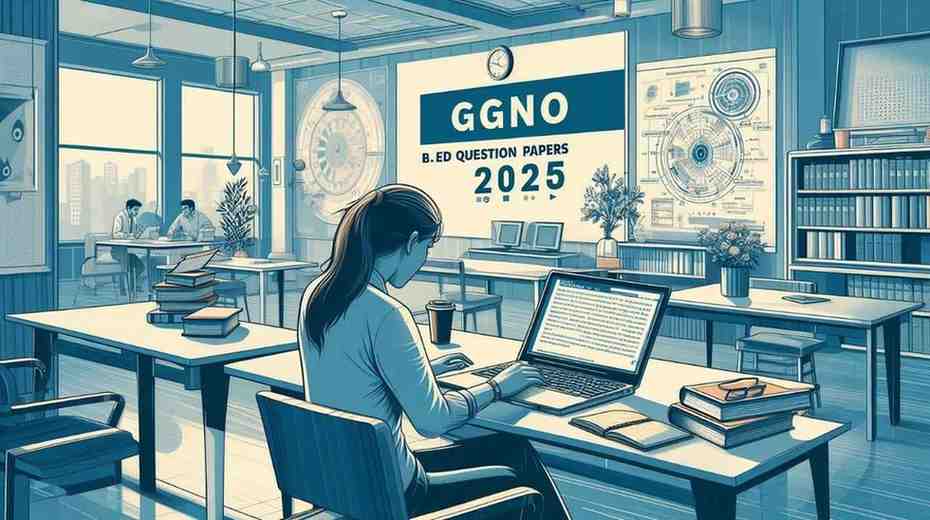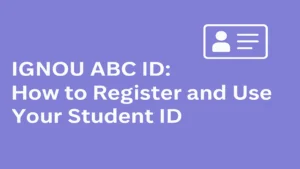The IGNOU B.Ed Exams 2025 are a crucial step in your journey to becoming a professional educator. As one of the most flexible and popular distance education programs in India, the Bachelor of Education (B.Ed) course from IGNOU offers aspiring teachers the chance to gain in-depth knowledge and practical experience.
In this article, we will walk you through everything you need to know about the IGNOU B.Ed exams, including the question paper format, exam preparation strategies, and tips to excel. Whether you’re new to the B.Ed program or preparing for your final exams, this comprehensive guide will help you navigate every step of your preparation.
Introduction to IGNOU B.Ed Exams 2025
1. What is the IGNOU B.Ed Program?
The IGNOU B.Ed program is a distance education course designed to equip individuals with the skills and knowledge required for a career in teaching. It covers a wide range of topics, from teaching methodologies to educational psychology, and provides practical training through internship and project work. The program is especially popular among working professionals because it offers flexibility and a robust curriculum.
2. Importance of IGNOU B.Ed Exam Papers
The IGNOU B.Ed exam papers are crucial for assessing the student’s understanding of both theoretical concepts and practical skills. The exams evaluate a candidate’s knowledge in core areas of education, including pedagogy, learning theories, child development, and educational planning. Performing well on these exams is key to achieving a successful career in education.
3. Overview of Exam Structure and Format for 2025
The exam structure for IGNOU B.Ed 2025 will follow the traditional pattern of multiple-choice questions (MCQs), short-answer questions, and long-answer questions. The overall goal is to assess the student’s grasp of theoretical knowledge, application of teaching strategies, and critical thinking.
Detailed Breakdown of the IGNOU B.Ed Exam Format
1. Types of Questions in B.Ed Exams
The IGNOU B.Ed exam papers typically consist of different question types:
- MCQs (Multiple Choice Questions): These questions test the student’s recall and basic understanding of key concepts.
- Short-Answer Questions: These questions require brief, focused responses that highlight the candidate’s understanding of a specific topic.
- Long-Answer Questions: These are more detailed responses, where students are expected to provide in-depth analysis, theoretical insights, and practical examples.
2. Weightage of Topics in the 2025 B.Ed Exam Papers
Each subject has a unique distribution of topics, with certain sections carrying more weight in the exams. For example:
- Pedagogical Theories and Learning Methods may have more questions.
- Topics like Educational Psychology, Childhood and Growing Up, and Language Education are fundamental and should be prioritized in your study plan.
3. Duration and Marking Scheme of the 2025 B.Ed Exam
The duration of the B.Ed exams is typically 3 hours, with marks distributed as follows:
- MCQs: 20-25% of total marks.
- Short-Answer Questions: 30-40% of total marks.
- Long-Answer Questions: 40-50% of total marks.
Accessing IGNOU B.Ed Question Papers
1. Where to Find Previous Year’s B.Ed Question Papers
To aid your preparation, it is essential to practice previous years’ question papers. These can be accessed from the IGNOU official website, academic forums, or online student communities. Many websites and educational platforms offer free downloads of past papers.
2. Benefits of Practicing Past B.Ed Question Papers
Solving past question papers allows you to:
- Understand the exam format and question types.
- Identify frequently asked topics.
- Practice under exam conditions to improve time management.
By regularly practicing these papers, you can build confidence and develop effective exam strategies.
3. Analyzing Past Papers: Identifying Repeated Topics and Questions
Over the years, certain topics are often repeated in the exams. Identifying these trends can help you focus your study efforts on high-yield areas. Keep track of topics that show up consistently, as they are likely to appear in the 2025 exams.
IGNOU B.Ed Exam Subjects and Syllabus Breakdown
1. Core Subjects in the B.Ed Program
The IGNOU B.Ed program includes subjects that focus on various aspects of education:
- Childhood and Growing Up: Understanding child development from a psychological perspective.
- Learning and Teaching: Insights into effective teaching strategies and learning theories.
- Educational Psychology: The role of psychology in education.
- Language Education: Teaching languages and understanding language development.
2. Key Concepts to Focus on in Each Subject
Focus on mastering key concepts within each subject. For example:
- In Childhood and Growing Up, focus on child psychology, cognitive development, and learning stages.
- For Educational Psychology, prioritize understanding concepts such as learning theories, behaviorism, and constructivism.
3. Elective Subjects and Their Relevance to the Question Paper Format
IGNOU allows students to choose elective subjects like Educational Management or Special Education. These subjects are important because they contribute to the overall exam preparation and add diversity to the exam paper.
How to Prepare for the IGNOU B.Ed Exams
1. Creating a Study Plan for B.Ed Exams
An effective study plan is the foundation of successful exam preparation. Start by:
- Allocating time for each subject based on its weightage in the exam.
- Reviewing your syllabus and identifying the key topics.
- Setting daily, weekly, and monthly goals to stay on track.
2. Recommended Books and Study Materials for B.Ed Students
IGNOU provides official study materials for B.Ed students, which should be your primary reference. You can supplement these with textbooks or guides suggested by your professors or fellow students. Popular recommendations include:
- “Educational Psychology” by J.P. Das.
- “Teaching Learning and Pedagogy” by J.C. Aggarwal.
3. Time Management Strategies for Effective Exam Preparation
Effective time management is essential:
- Create a timetable to divide your study time evenly across subjects.
- Avoid last-minute cramming by sticking to your timetable.
- Take regular breaks to maintain focus and avoid burnout.
4. Using IGNOU’s Official Study Material to Your Advantage
The official IGNOU study materials are designed specifically for your exams. Make sure to:
- Go through each chapter thoroughly.
- Take notes on key concepts.
- Refer to the summary sections for quick revision.
Understanding the IGNOU B.Ed Question Paper Pattern for 2025
1. Expected Changes in the 2025 B.Ed Question Paper Pattern
While the pattern is unlikely to change drastically, it’s always a good idea to stay updated on any announcements regarding the question paper format. IGNOU may occasionally tweak the number of questions or their types.
2. Breakdown of Question Paper Sections: Theory, Practical, and Internal Assessments
The B.Ed exams are a mix of theory and practical components:
- Theory: Includes MCQs, short-answer, and long-answer questions.
- Practical exams: Usually involve teaching demonstrations, lesson plans, and classroom management strategies.
- Internal assessments: Include assignments, projects, and evaluations by mentors.
3. Strategies for Answering Different Question Types in the B.Ed Exam
To excel in each section:
- For MCQs, read all options carefully and eliminate the obvious wrong ones.
- For short answers, write concise but informative responses.
- For long answers, structure your responses with an introduction, body, and conclusion, and provide real-life examples where applicable.
Common Mistakes to Avoid in the IGNOU B.Ed Exams
1. Ignoring the Syllabus and Study Materials
One of the biggest mistakes students make is neglecting the official syllabus and study materials. Sticking to the prescribed resources ensures that you’re studying the relevant content.
2. Not Managing Time Effectively During the Exam
Poor time management can lead to incomplete papers. Practice time-bound mock tests to improve your efficiency.
3. Overloading with Information: The Danger of Writing Too Much
While it’s tempting to provide extensive information, overloading your answers can make them unclear. Focus on quality, not quantity.
4. Not Reviewing Your Answers Before Submission
Always leave a few minutes at the end to review your answers. This will help you spot any mistakes and ensure clarity in your responses.
The Role of Internal Assessments in the B.Ed Exam
1. Understanding the Weightage of Internal Assessments
Internal assessments carry significant weight in your final marks. These include assignments, projects, and practical evaluations.
2. How to Prepare for Internal Assessments
Start by focusing on the assignment guidelines and project criteria. Work closely with your mentors to ensure your work aligns with expectations.
3. Submission Guidelines for Assignments and Projects
Make sure to follow the submission deadlines and format guidelines. Late submissions can result in penalties.
Preparing for Practical Examinations in the B.Ed Program
1. What is Included in the Practical Exam?
The practical exam assesses your teaching skills, including lesson planning, classroom management, and teaching delivery. You may be asked to conduct a mock teaching session.
2. How to Develop a Strong Practical Exam Strategy
Prepare by practicing lesson plans, teaching techniques, and classroom activities. The more confident you are in your practical skills, the better you’ll perform.
3. Importance of Practicing Teaching Techniques
Effective teaching requires confidence and clear communication. Practice teaching in front of a mirror or in a group to refine your techniques.
How to Stay Motivated During IGNOU B.Ed Exam Preparation
1. Setting Realistic Goals and Milestones
Break down your preparation into manageable goals. Setting achievable milestones helps maintain motivation and keeps your momentum going.
2. Building Consistency in Your Study Routine
Create a consistent study schedule and stick to it. Consistency is key to long-term success.
3. Dealing with Stress and Anxiety Before the Exam
Practice relaxation techniques, like deep breathing or mindfulness, to manage stress and maintain focus.
Final Revision Tips for IGNOU B.Ed Students
1. Last-Minute Revision Strategies
In the days leading up to the exam:
- Focus on key topics that are most likely to appear based on previous papers and your syllabus.
- Use summaries and highlighted notes to quickly review concepts.
- Do mock tests to simulate the real exam environment and manage time efficiently.
2. Focusing on Weak Areas During Revision
Identify your weakest subjects or topics and prioritize them in your last-minute revision. Spend more time on topics you find difficult or those that are heavily weighted in the exam.
3. Creating a Revision Schedule for Maximum Efficiency
In the final week of preparation, create a revision schedule that gives ample time to each subject:
- Day 1-3: Review high-weightage subjects.
- Day 4-5: Focus on practical applications and case studies.
- Day 6-7: Do mock exams and revision for weak areas.
The goal is to revise systematically and not cram everything in at the last moment.
Tips for Exam Day: What to Do and What to Avoid
1. What to Bring on the Day of the Exam
Ensure that you have the following essentials:
- Admit card: A mandatory document to enter the exam hall.
- Valid ID proof: Such as a voter ID or driver’s license.
- Pens, pencils, and a blue or black ballpoint pen.
- A clear bottle of water (unless otherwise stated).
Double-check the exam center location to avoid last-minute stress.
2. How to Stay Calm and Focused During the Exam
Staying calm under exam pressure is essential:
- Practice deep breathing exercises to stay relaxed.
- If you feel stuck on a question, move on and come back to it later.
Remember, your performance in the exam is more about clarity and confidence than about knowing everything.
3. What to Do if You’re Stuck on a Question
If you get stuck on a question:
- Skip it temporarily and move on to the next question.
- Return to it after completing the rest of the paper.
- If unsure, try to eliminate obviously incorrect answers for MCQs and make an educated guess.
After the Exam: Post-Exam Strategies and Reflection
1. How to Handle the Wait for Results
After your exams, focus on staying positive and patient. It can be stressful waiting for results, but keep busy with other constructive activities. You can always use the time to plan for your future studies or gain teaching experience through internships.
2. What to Do If You Need to Retake the Exam
If you don’t pass a subject, don’t panic! You can always retake the exam. Use the feedback from your earlier attempt to identify areas of improvement:
- Analyze the mistakes you made.
- Rework on topics you struggled with during the exam.
- Practice more sample papers and revise consistently.
3. Learning from Mistakes: How to Improve for Future Exams
If you didn’t perform as well as expected, take this as an opportunity to learn:
- Reflect on your study habits and see what you can improve.
- Engage with your professors or peers for additional tips and feedback.
- Adapt your study plan for the next round of exams.
Mistakes are part of the learning process and will help you perform better next time.
Conclusion: Success in IGNOU B.Ed Exams 2025
1. Final Words of Encouragement
Success in the IGNOU B.Ed exams doesn’t happen overnight, but with determination, consistency, and smart study strategies, you can absolutely excel. Keep a positive attitude, stay disciplined, and believe in your abilities.
2. Key Takeaways from This Guide
To summarize:
- Focus on the syllabus, practice past papers, and follow the exam pattern.
- Don’t neglect internal assessments; they are part of your overall evaluation.
- Create a structured study plan and stick to it.
- Use your final revision days wisely to target weak areas and practice time management.
Remember, the goal is not just to pass the exams, but to become a confident, skilled teacher ready to shape the minds of future generations!
Frequently Asked Questions (FAQs) About IGNOU B.Ed Exam Papers
How Can I Get IGNOU B.Ed Past Question Papers?
You can find past IGNOU B.Ed question papers from a variety of reliable sources:
The official IGNOU website offers downloadable PDFs of past papers for various B.Ed courses.
Educational forums and student communities also share past question papers and discussion groups.
Many students also opt for books that compile past years’ papers, available at online bookstores or academic shops.
Using these resources will give you insights into the exam format, the type of questions, and the most frequently tested topics.
Are There Any Tips for Answering Long-Answer Questions in the B.Ed Exam?
For long-answer questions, it’s important to structure your answer clearly:
Introduction: Start with a brief overview of the topic.
Body: Explain concepts in detail, supporting them with examples and references to the syllabus.
Conclusion: Summarize the main points and provide a concluding thought.
Focus on clarity, organization, and providing relevant examples to demonstrate your depth of knowledge.
How Much Time Should I Spend on Each Section of the B.Ed Exam?
Time management is critical to completing the exam on time:
For MCQs, spend about 30-40 seconds per question.
For short-answer questions, allocate around 3-5 minutes per question.
For long-answer questions, you should dedicate 20-25 minutes per answer.
This allocation will help you maximize your score while ensuring that you don’t run out of time for any section.
Is There Negative Marking for MCQs in the B.Ed Exams?
No, IGNOU does not have negative marking for MCQ-based questions. This allows you to attempt all the questions with confidence. Even if you’re unsure, it’s better to guess than to leave a question unanswered.
Related Posts:
- IGNOU Question Paper Format for June/December 2025 Sessions: The Best Guide
- IGNOU Exam Pattern for MA in English: A Comprehensive Guide 2025
- IGNOU Practical Examinations: A Comprehensive Guide 2025
- How Long Does It Take to Update IGNOU Assignments Status: Best Guide 2025
- Create a Proper IGNOU Assignment Front Page 2025: Step-to-Step Guide




